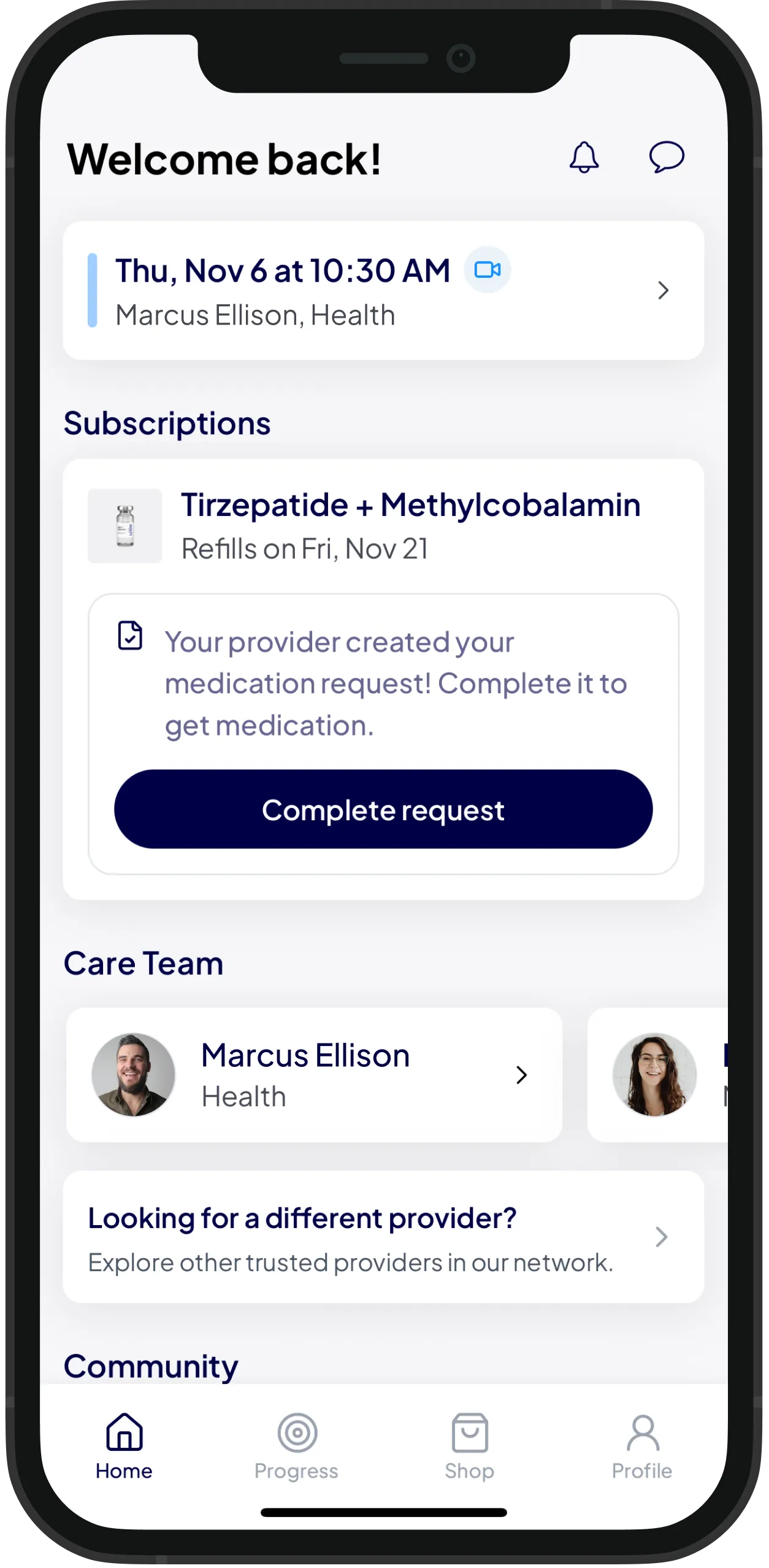Ready to transform your health?
Unlock access to expert guidance and a weight care plan crafted just for you.
Similar Articles
Similar Articles

GLP-1s for Pre-diabetes: Can You Prevent Type II Diabetes?
GLP-1s for Pre-diabetes: Can You Prevent Type II Diabetes?

Is Long-Term GLP-1 Use Safe? What 10-Year Data Suggests
Is Long-Term GLP-1 Use Safe? What 10-Year Data Suggests

Semaglutide vs Tirzepatide: Which Works Faster and Which Is Better For You?
Semaglutide vs Tirzepatide: Which Works Faster and Which Is Better For You?
GLP 1s and Cardiometabolic Health: How These Medications Support the Heart and Long Term Wellness
GLP 1 medications do far more than support weight loss. Learn how they improve blood pressure, cholesterol, insulin resistance, liver health, inflammation, and overall cardiometabolic wellness. See what major studies show and whether treatment may be right for you.

Table of Contents
Table of Contents
How GLP-1s Influence Cardiometabolic Pathways
What Large Cardiovascular Studies Have Shown
GLP-1s and Their Impact on Blood Pressure
Effects on Cholesterol and Lipids
Effects on Insulin Resistance
Reduced Inflammation and Oxidative Stress
Why These Benefits Matter Beyond Weight Loss
FAQs
References
How GLP-1s Influence Cardiometabolic Pathways
What Large Cardiovascular Studies Have Shown
GLP-1s and Their Impact on Blood Pressure
Effects on Cholesterol and Lipids
Effects on Insulin Resistance
Reduced Inflammation and Oxidative Stress
Why These Benefits Matter Beyond Weight Loss
FAQs
References
The popularity of GLP 1 medications often centers around weight loss, but the real story is much broader. These medications were originally created for metabolic and cardiovascular health, not for weight loss alone. As research has expanded, scientists have discovered that GLP 1s can improve a wide range of markers that influence long term heart health, inflammation, insulin sensitivity, and diseases such as type 2 diabetes.
Many people who start GLP 1 therapy do so because they want help with weight reduction, but most begin noticing deeper changes in how their body feels and functions. They experience steadier energy, improved blood sugar patterns, reduced cravings, lower blood pressure, and better cholesterol levels. These shifts are part of a larger cardiometabolic picture that is often not discussed in everyday conversations about GLP 1 medications.
This article explains how GLP 1s improve overall cardiometabolic health. It covers how the medications work, what major clinical trials have found, what benefits extend beyond weight changes, and how these effects may support long term health.
If you want to explore whether GLP 1 treatment might be right for your goals, you can check your eligibility.
How GLP-1s Influence Cardiometabolic Pathways
GLP-1 medications work through several biological pathways that directly influence heart and metabolic health. They help regulate blood sugar by increasing insulin sensitivity and slowing the movement of food through the stomach, which prevents sharp spikes in glucose. By doing this consistently, they reduce the chronic stress that fluctuating blood sugar places on the heart, blood vessels, and pancreas.
These medications also help lower inflammation, which plays a major role in conditions such as high blood pressure, fatty liver, and heart disease. People often find that they experience fewer sugar crashes and more stable energy throughout the day. Because appetite decreases in a gradual way, calorie intake tends to fall without extreme dieting, which influences several long term metabolic markers.
While weight loss contributes to improved cardiometabolic health, many benefits occur even before significant weight changes appear, which suggests that GLP 1 medications have independent effects on metabolism.
What Large Cardiovascular Studies Have Shown
One of the most important studies examining GLP 1 effects on the heart was the SUSTAIN 6 trial. This was a major clinical study that followed people at high risk of cardiovascular disease. Those who took semaglutide had significantly fewer heart-related events over the study period. This included reductions in heart attack, stroke, and cardiovascular death. These results were groundbreaking because they showed that GLP 1 medications could protect the heart independently of weight loss. While these trials show impressive results, many patients are curious about the safety of these medications over decades. 10-year data on GLP-1 use suggests that these protective effects are paired with a strong long-term safety profile.

A similar pattern was observed in the LEADER trial, which studied liraglutide. Participants on liraglutide had a meaningful reduction in cardiovascular events, along with improvements in blood sugar, cholesterol, and blood pressure. These trials helped establish GLP 1s as cardioprotective medications, long before they became known for weight loss.
More recently, researchers have studied tirzepatide, a medication that activates both GLP 1 and GIP receptors. Early findings show significant improvements in blood sugar, inflammatory markers, and weight, which are all relevant for long term cardiovascular health. Larger outcome trials are ongoing, but early signals suggest strong potential benefits.
GLP-1s and Their Impact on Blood Pressure
High blood pressure is one of the most important risk factors for heart disease, stroke, kidney disease, and metabolic complications. Many people notice improvements in blood pressure within weeks to months after starting GLP 1 therapy.
These changes occur partly because of weight reduction, but research shows that GLP 1s also help blood vessels relax and decrease inflammation. This makes it easier for the heart to pump blood throughout the body. Many people who start GLP 1 treatment see their blood pressure decrease by several points without changing medications, and some eventually need fewer antihypertensive drugs. These changes should always be monitored by a clinician to ensure safe adjustments.

Effects on Cholesterol and Lipids
GLP 1 medications often improve cholesterol levels. They tend to lower triglycerides, which are more harmful to cardiovascular health, and may reduce LDL levels modestly. The most meaningful changes are usually seen in triglycerides and non-HDL cholesterol, which better reflect metabolic health.
These improvements happen as the body becomes more efficient at processing energy and storing less fat in the liver and bloodstream. Many people also see reductions in waist circumference and visceral fat, both of which influence cholesterol patterns.
Effects on Insulin Resistance
Insulin resistance is one of the strongest predictors of metabolic disease, cardiovascular issues, and long term weight regain. GLP 1 medications directly improve insulin sensitivity by helping the body use insulin more efficiently, reducing insulin spikes after meals, and creating more stable blood sugar levels.
These improvements may help decrease fatigue, lower cravings, smooth out energy levels, and support long term metabolic health. When insulin resistance improves, fat storage patterns begin to shift, and people often notice that weight management feels more achievable.
Reduced Inflammation and Oxidative Stress
Chronic inflammation plays a major role in heart disease, obesity, metabolic syndrome, and type 2 diabetes. GLP 1 medications have been shown to lower inflammatory markers such as C-reactive protein. They also reduce oxidative stress, which helps protect blood vessels and organs.
Lower inflammation often leads to improvements in fatigue, joint discomfort, and overall energy.

Why These Benefits Matter Beyond Weight Loss
Weight reduction is part of the GLP 1 story, but not the whole picture. The metabolic effects that occur beneath the surface often matter more for long term health than the number on the scale. Improvements in blood sugar, blood pressure, cholesterol, inflammation, and liver function all add up to stronger cardiovascular protection.
People who use GLP 1 medications often say they feel more stable, less inflamed, and more in control of their daily hunger and energy. These changes play a meaningful role in long term wellness.
If you want to explore whether these benefits may apply to your situation, you can check your eligibility here:
Check your eligibility: https://app.joinmochi.com/eligibility
FAQs
Do GLP 1 medications help with heart health?
Yes. Multiple large trials have shown that GLP 1 medications reduce the risk of major cardiovascular events, including heart attack and stroke.
Do they help even if you do not lose much weight?
Yes. GLP 1s improve insulin resistance, blood sugar, inflammation, and blood pressure independent of weight loss.
Can GLP 1s replace blood pressure or cholesterol medications?
Some people may need fewer medications over time, but this should always be managed by a clinician.
How long does it take to see cardiometabolic changes?
Blood sugar improvements may appear within weeks. Blood pressure and cholesterol changes often take one to three months.
Are GLP 1s safe for people with heart conditions?
They are considered safe for many people with cardiovascular risk, but individual evaluation is necessary. Please consult your provider!
Check Your Eligibility
If you are interested in GLP 1 treatment to support weight, metabolic health, or cardiometabolic improvements, you can start by completing Mochi’s simple eligibility questionnaire. It takes only a few minutes and helps our clinical team understand your goals, health history, and the safest path forward. You can begin your eligibility check today and explore your treatment options. Check your eligibility
References
Marso, S. P., Bain, S. C., Consoli, A., et al. (2016). Semaglutide and cardiovascular outcomes in patients with type 2 diabetes. New England Journal of Medicine, 375(19), 1834 to 1844.
Marso, S. P., Daniels, G. H., Brown-Frandsen, K., et al. (2016). Liraglutide and cardiovascular outcomes in type 2 diabetes. New England Journal of Medicine, 375(4), 311 to 322.
Davies, M. J., Aroda, V. R., Collins, B. S., et al. (2021). Effects of tirzepatide on cardiometabolic risk factors. Diabetes Care, 44(12), 2783 to 2793.
Astrup, A., Rössner, S., Van Gaal, L., et al. (2014). Effects of liraglutide on visceral fat in women with obesity. International Journal of Obesity, 38(9), 1265 to 1273.
Elkind-Hirsch, K., et al. (2021). Metabolic benefits of semaglutide in women with metabolic disease. Reproductive Biology and Endocrinology, 19, 1 to 10.
USDA FoodData Central. (2024). Nutrient composition data.
The popularity of GLP 1 medications often centers around weight loss, but the real story is much broader. These medications were originally created for metabolic and cardiovascular health, not for weight loss alone. As research has expanded, scientists have discovered that GLP 1s can improve a wide range of markers that influence long term heart health, inflammation, insulin sensitivity, and diseases such as type 2 diabetes.
Many people who start GLP 1 therapy do so because they want help with weight reduction, but most begin noticing deeper changes in how their body feels and functions. They experience steadier energy, improved blood sugar patterns, reduced cravings, lower blood pressure, and better cholesterol levels. These shifts are part of a larger cardiometabolic picture that is often not discussed in everyday conversations about GLP 1 medications.
This article explains how GLP 1s improve overall cardiometabolic health. It covers how the medications work, what major clinical trials have found, what benefits extend beyond weight changes, and how these effects may support long term health.
If you want to explore whether GLP 1 treatment might be right for your goals, you can check your eligibility.
How GLP-1s Influence Cardiometabolic Pathways
GLP-1 medications work through several biological pathways that directly influence heart and metabolic health. They help regulate blood sugar by increasing insulin sensitivity and slowing the movement of food through the stomach, which prevents sharp spikes in glucose. By doing this consistently, they reduce the chronic stress that fluctuating blood sugar places on the heart, blood vessels, and pancreas.
These medications also help lower inflammation, which plays a major role in conditions such as high blood pressure, fatty liver, and heart disease. People often find that they experience fewer sugar crashes and more stable energy throughout the day. Because appetite decreases in a gradual way, calorie intake tends to fall without extreme dieting, which influences several long term metabolic markers.
While weight loss contributes to improved cardiometabolic health, many benefits occur even before significant weight changes appear, which suggests that GLP 1 medications have independent effects on metabolism.
What Large Cardiovascular Studies Have Shown
One of the most important studies examining GLP 1 effects on the heart was the SUSTAIN 6 trial. This was a major clinical study that followed people at high risk of cardiovascular disease. Those who took semaglutide had significantly fewer heart-related events over the study period. This included reductions in heart attack, stroke, and cardiovascular death. These results were groundbreaking because they showed that GLP 1 medications could protect the heart independently of weight loss. While these trials show impressive results, many patients are curious about the safety of these medications over decades. 10-year data on GLP-1 use suggests that these protective effects are paired with a strong long-term safety profile.

A similar pattern was observed in the LEADER trial, which studied liraglutide. Participants on liraglutide had a meaningful reduction in cardiovascular events, along with improvements in blood sugar, cholesterol, and blood pressure. These trials helped establish GLP 1s as cardioprotective medications, long before they became known for weight loss.
More recently, researchers have studied tirzepatide, a medication that activates both GLP 1 and GIP receptors. Early findings show significant improvements in blood sugar, inflammatory markers, and weight, which are all relevant for long term cardiovascular health. Larger outcome trials are ongoing, but early signals suggest strong potential benefits.
GLP-1s and Their Impact on Blood Pressure
High blood pressure is one of the most important risk factors for heart disease, stroke, kidney disease, and metabolic complications. Many people notice improvements in blood pressure within weeks to months after starting GLP 1 therapy.
These changes occur partly because of weight reduction, but research shows that GLP 1s also help blood vessels relax and decrease inflammation. This makes it easier for the heart to pump blood throughout the body. Many people who start GLP 1 treatment see their blood pressure decrease by several points without changing medications, and some eventually need fewer antihypertensive drugs. These changes should always be monitored by a clinician to ensure safe adjustments.

Effects on Cholesterol and Lipids
GLP 1 medications often improve cholesterol levels. They tend to lower triglycerides, which are more harmful to cardiovascular health, and may reduce LDL levels modestly. The most meaningful changes are usually seen in triglycerides and non-HDL cholesterol, which better reflect metabolic health.
These improvements happen as the body becomes more efficient at processing energy and storing less fat in the liver and bloodstream. Many people also see reductions in waist circumference and visceral fat, both of which influence cholesterol patterns.
Effects on Insulin Resistance
Insulin resistance is one of the strongest predictors of metabolic disease, cardiovascular issues, and long term weight regain. GLP 1 medications directly improve insulin sensitivity by helping the body use insulin more efficiently, reducing insulin spikes after meals, and creating more stable blood sugar levels.
These improvements may help decrease fatigue, lower cravings, smooth out energy levels, and support long term metabolic health. When insulin resistance improves, fat storage patterns begin to shift, and people often notice that weight management feels more achievable.
Reduced Inflammation and Oxidative Stress
Chronic inflammation plays a major role in heart disease, obesity, metabolic syndrome, and type 2 diabetes. GLP 1 medications have been shown to lower inflammatory markers such as C-reactive protein. They also reduce oxidative stress, which helps protect blood vessels and organs.
Lower inflammation often leads to improvements in fatigue, joint discomfort, and overall energy.

Why These Benefits Matter Beyond Weight Loss
Weight reduction is part of the GLP 1 story, but not the whole picture. The metabolic effects that occur beneath the surface often matter more for long term health than the number on the scale. Improvements in blood sugar, blood pressure, cholesterol, inflammation, and liver function all add up to stronger cardiovascular protection.
People who use GLP 1 medications often say they feel more stable, less inflamed, and more in control of their daily hunger and energy. These changes play a meaningful role in long term wellness.
If you want to explore whether these benefits may apply to your situation, you can check your eligibility here:
Check your eligibility: https://app.joinmochi.com/eligibility
FAQs
Do GLP 1 medications help with heart health?
Yes. Multiple large trials have shown that GLP 1 medications reduce the risk of major cardiovascular events, including heart attack and stroke.
Do they help even if you do not lose much weight?
Yes. GLP 1s improve insulin resistance, blood sugar, inflammation, and blood pressure independent of weight loss.
Can GLP 1s replace blood pressure or cholesterol medications?
Some people may need fewer medications over time, but this should always be managed by a clinician.
How long does it take to see cardiometabolic changes?
Blood sugar improvements may appear within weeks. Blood pressure and cholesterol changes often take one to three months.
Are GLP 1s safe for people with heart conditions?
They are considered safe for many people with cardiovascular risk, but individual evaluation is necessary. Please consult your provider!
Check Your Eligibility
If you are interested in GLP 1 treatment to support weight, metabolic health, or cardiometabolic improvements, you can start by completing Mochi’s simple eligibility questionnaire. It takes only a few minutes and helps our clinical team understand your goals, health history, and the safest path forward. You can begin your eligibility check today and explore your treatment options. Check your eligibility
References
Marso, S. P., Bain, S. C., Consoli, A., et al. (2016). Semaglutide and cardiovascular outcomes in patients with type 2 diabetes. New England Journal of Medicine, 375(19), 1834 to 1844.
Marso, S. P., Daniels, G. H., Brown-Frandsen, K., et al. (2016). Liraglutide and cardiovascular outcomes in type 2 diabetes. New England Journal of Medicine, 375(4), 311 to 322.
Davies, M. J., Aroda, V. R., Collins, B. S., et al. (2021). Effects of tirzepatide on cardiometabolic risk factors. Diabetes Care, 44(12), 2783 to 2793.
Astrup, A., Rössner, S., Van Gaal, L., et al. (2014). Effects of liraglutide on visceral fat in women with obesity. International Journal of Obesity, 38(9), 1265 to 1273.
Elkind-Hirsch, K., et al. (2021). Metabolic benefits of semaglutide in women with metabolic disease. Reproductive Biology and Endocrinology, 19, 1 to 10.
USDA FoodData Central. (2024). Nutrient composition data.
Read next
Ready to transform your health?
Unlock access to expert guidance and a weight care plan crafted just for you.

Ready to transform your health?
Unlock access to expert guidance and a weight care plan crafted just for you.

Ready to transform your health?
Unlock access to expert guidance and a weight care plan crafted just for you.


© 2026 Mochi Health
All professional medical services are provided by licensed physicians and clinicians affiliated with independently owned and operated professional practices. Mochi Health Corp. provides administrative and technology services to affiliated medical practices it supports, and does not provide any professional medical services itself.


© 2026 Mochi Health
All professional medical services are provided by licensed physicians and clinicians affiliated with independently owned and operated professional practices. Mochi Health Corp. provides administrative and technology services to affiliated medical practices it supports, and does not provide any professional medical services itself.


© 2026 Mochi Health
All professional medical services are provided by licensed physicians and clinicians affiliated with independently owned and operated professional practices. Mochi Health Corp. provides administrative and technology services to affiliated medical practices it supports, and does not provide any professional medical services itself.















